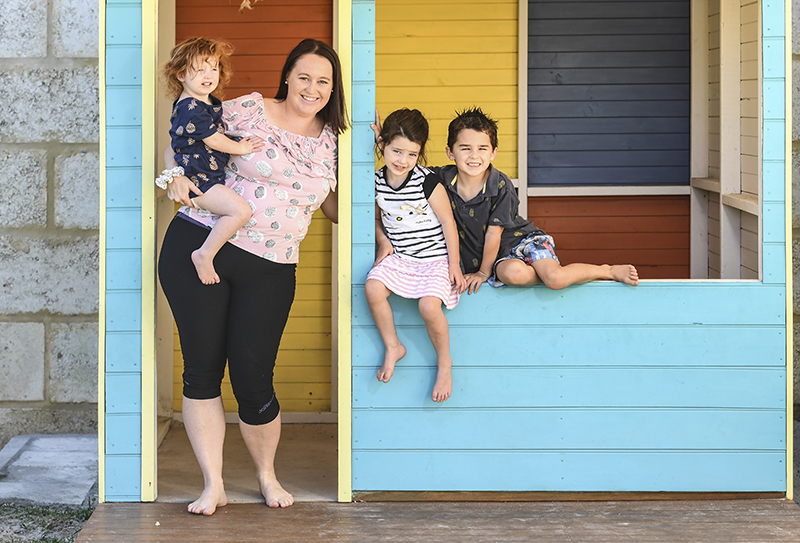Search
Showing results for "Au"
Research
Developmental regulation of type 1 and type 3 interferon production and risk for infant infections and asthma developmentType 1 and 3 interferon response capacity appears strongly developmentally constrained at birth

News & Events
It’s not just physical illness that will have an impact: A ground-breaking study is investigating the effect of COVID-19 on community wellbeingIn an Australian-first study, researchers at The Kids Research Institute Australia are investigating the effects of COVID-19 on the wellbeing of more than 2,000 families in the northern suburbs of Perth, measuring their perceived stress, financial hardship and family functioning during the pandemic.
Research
Aging of preleukemic thymocytes drives CpG island hypermethylation in T-cell acute lymphoblastic leukemiaCancer cells display DNA hypermethylation at specific CpG islands in comparison to their normal healthy counterparts, but the mechanism that drives this so-called CpG island methylator phenotype (CIMP) remains poorly understood. Here, we show that CpG island methylation in human T-cell acute lymphoblastic leukemia (T-ALL) mainly occurs at promoters of Polycomb Repressor Complex 2 (PRC2) target genes that are not expressed in normal or malignant T-cells and which display a reciprocal association with H3K27me3 binding.
Research
Assessment of different techniques for the administration of inhaled salbutamol in children breathing spontaneously via tracheal tubes, supraglottic airway devices, and tracheostomiesPerioperative respiratory adverse events account for a third of all perioperative cardiac arrests, with bronchospasm and laryngospasm being most common. Standard treatment for bronchospasm is administration of inhaled salbutamol, via pressurized metered dose inhaler. There is little evidence on the best method of attaching the pressurized metered dose inhaler to the artificial airway during general anesthesia. The aim of this study is to investigate the best method to deliver aerosolized salbutamol via pressurized metered dose inhaler to the lungs of an anesthetized child.
Research
Maternal immune-related conditions during pregnancy may be a risk factor for neuropsychiatric problems in offspring throughout childhood and adolescenceEmerging research suggests that maternal immune activation (MIA) may be associated with an increased risk of adverse neurodevelopmental and mental health outcomes in offspring. Using data from the Raine Study, we investigated whether MIA during pregnancy was associated with increased behavioral and emotional problems in offspring longitudinally across development.
Research
Longitudinal egg-specific regulatory T- and B-cell development: Insights from primary prevention clinical trials examining the timing of egg introductionEgg allergy affects almost 1 in 10 Australian infants. Early egg introduction has been associated with a reduced risk in developing egg allergy; however, the immune mechanisms underlying this protection remain unclear.
Research
Prevalence and pattern of energy drink intake among Australian adolescentsEnergy drinks (ED) are popular among young people despite evidence of associated health risks. Research into the prevalence and pattern of ED intake among young people is sparse. The present study investigates the prevalence and pattern of ED intake among a large sample of adolescents, including how many consume them, how often, for what reasons and in what contexts.
Research
Whole-Cell Pertussis Vaccination and Decreased Risk of IgE-Mediated Food Allergy: A Nested Case-Control StudyAustralian infants who received whole-cell pertussis vaccines were less likely to be diagnosed with food allergy in childhood
Research
A role for early oral exposure to house dust mite allergens through breast milk in IgE-mediated food allergy susceptibilityThis study highlights an unpredicted potential risk factor for the development of food allergy, that is, D pteronyssinus allergens in breast milk
Research
Changing rules, recommendations, and risks: COVID-19 vaccination decisions and emotions during pregnancyAs COVID-19 vaccinations rolled out globally from late 2020, rules and recommendations regarding vaccine use in pregnancy shifted rapidly. Pre-registration COVID-19 vaccine trials excluded those who were pregnant. Initial Australian medical advice did not routinely recommend COVID-19 vaccines in pregnancy, due to limited safety data and little perceived risk of local transmission.
